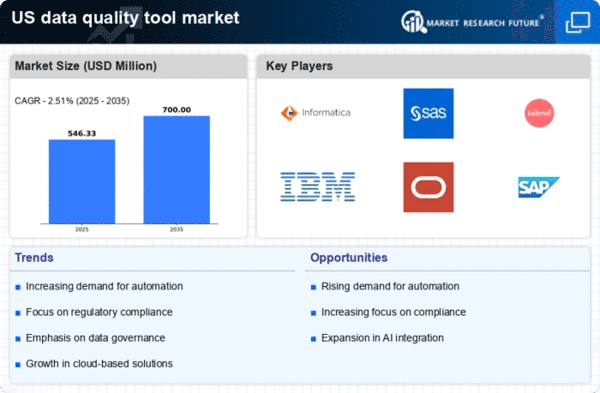Increased Regulatory Scrutiny
The landscape of regulatory compliance in the US is becoming increasingly complex, with organizations facing stringent requirements regarding data management and reporting. Regulatory bodies are imposing fines for non-compliance, which can reach millions of dollars. Consequently, businesses are compelled to invest in data quality tools to ensure adherence to regulations such as the General Data Protection Regulation (GDPR) and the Health Insurance Portability and Accountability Act (HIPAA). The data quality-tool market is thus witnessing a surge in demand as companies prioritize compliance and risk management. This trend is likely to continue, with an estimated growth rate of 15% in the sector as organizations seek to mitigate risks associated with data breaches and inaccuracies.
Emergence of Big Data Analytics
The proliferation of big data in the US has created both opportunities and challenges for organizations. As companies collect vast amounts of data, the need for effective data quality tools becomes increasingly critical to extract meaningful insights. Poor data quality can lead to flawed analytics, resulting in misguided business strategies. The data quality-tool market is responding to this challenge by offering advanced solutions that integrate seamlessly with big data analytics platforms. This trend is expected to propel market growth, with an anticipated increase of 25% in the adoption of data quality tools specifically designed for big data environments. Organizations are recognizing that investing in data quality is essential for harnessing the full potential of their data assets.
Rising Demand for Data Accuracy
The increasing reliance on data-driven decision-making across various sectors in the US has led to a heightened demand for accuracy in data management. Organizations are recognizing that poor data quality can result in significant financial losses, estimated at around $3 trillion annually in the US. This awareness drives investments in the data quality-tool market, as businesses seek solutions that ensure data integrity and reliability. As companies strive to enhance their operational efficiency, the data quality-tool market is expected to experience robust growth, with projections indicating a compound annual growth rate (CAGR) of approximately 20% over the next five years. This trend underscores the critical role that data quality tools play in maintaining competitive advantage and fostering informed decision-making.
Adoption of Cloud-Based Solutions
The shift towards cloud computing in the US has transformed the data management landscape, leading to an increased adoption of cloud-based data quality tools. Organizations are drawn to the scalability, flexibility, and cost-effectiveness that cloud solutions offer. As businesses migrate their operations to the cloud, the need for robust data quality tools becomes paramount to ensure data consistency and accuracy across platforms. The data quality-tool market is projected to grow significantly, with cloud-based solutions expected to account for over 60% of the market share by 2026. This transition not only enhances operational efficiency but also facilitates real-time data analysis, further driving the demand for effective data quality management.
Growing Focus on Customer Experience
In the competitive landscape of the US market, organizations are placing a greater emphasis on enhancing customer experience. Accurate and reliable data is crucial for understanding customer preferences and behaviors. As businesses strive to deliver personalized services, the demand for data quality tools that ensure data accuracy and consistency is on the rise. The data quality-tool market is likely to benefit from this trend, with projections indicating a growth rate of 18% as companies invest in tools that enable them to better understand and serve their customers. This focus on customer-centric strategies underscores the importance of data quality in driving customer satisfaction and loyalty.

















